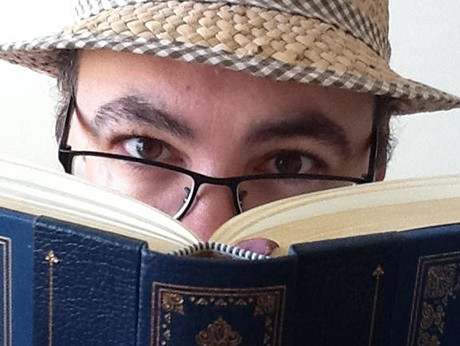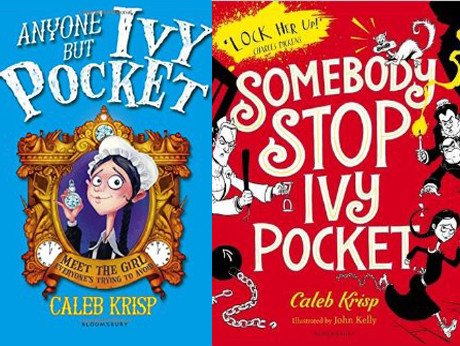
Warning. This article contains spoilers. There are two reasons for this. 1) The story below could not be written without including the endings of certain very famous books. 2) I like spoiling things. Now to the business...
I have a confession. It’s of the serious and shocking variety - as all good confessions should be. I am a wanted man. Hunted by militant librarians across eleven counties. I am charged with the worst sort of library crime - defacing books. And I am utterly guilty. But sometimes, doing something wrong is the only right thing to do.
This confession begins in childhood. It concerns a boy. Twelve years old. Dark Hair. Brown eyes. A mind sharper than a huntsman’s axe. Or at very least a new HB pencil. For the purposes of anonymity I will call this boy Caleb Whisk. Or possibly Saleb Krisp. Fine, let’s call him Orlando Pudding and be done with it.
Now young Orlando wasn’t much of a reader. He preferred to make up stories in his head and then act them out in the privacy of a busy supermarket or crowded restaurant. His mother - a nasty old bat who insisted that her son cut his own food simply because he had the necessary hands and utensils - was always shushing him and demanding he sit back down and stop pretending he was being chased by a brain eating four-headed fox. He was rather good at it.
His sixth grade teacher found Orlando a lot of hard work. He hardly ever sat still. He was always making things up and talking to people that weren’t there. This teacher decided that books were the answer. She took Orlando to the local library, got him a library card and filled his arms with a great pile of novels.
If the boy liked make-believe so much, then he was sure to love reading this collection of world famous books. So Orlando took the books home, picked the first one up from the pile and rather reluctantly began to read.
The book was ‘Treasure Island’ by a dead fellow called Robert Louis Stevenson. Our young hero Jim finds himself in possession of a treasure map, which points to the location of an island filled with loot. He sets out on a ship and every page is packed full of pirates, mutiny and murder.
Orlando was hooked. Reading was the best fun a boy could have sitting at the kitchen table. He read the book in one sitting and things were going along swimmingly - until the final pages. As Orlando read the last chapter his mood turned rather sour. His nostrils flared. He began to huff and shake his head.
Treasure Island ends (spoiler alert) with some of the treasure being found. Young Jim sails back to England, is given a share of the bounty and vows that although there is more treasure still on the island he won’t be going back for it. Yes, you read that correctly. More treasure to be found, more adventure to be had - and Jim wants to sit at home sipping tea with his mummy, counting his gold. It was downright insulting!
Orlando felt betrayed. Duped. Taken advantage of. As such, drastic action was required. He took the book to his bedroom. Tore out the last five pages. Then, using an old typewriter, Orlando wrote a new ending. In it, Jim comes home and befriends a time-travelling inventor with enormous ears and tiny teeth - as you do. He then uses the treasure he has gained to fund the building of a turbo powered pirate ship - complete with rocket launchers, weather machines and sails that with the flick of a button would begin to spin violently, propelling the boat into the air.
Once back on Treasure Island, Jim fights a band of ghost pirates, a gigantic lobster and three villainous mermaids to get to the remaining treasure. Then he takes the loot and blows up the island. Now that’s an ending!
With the pages typed, Orlando cut them out and glued them into the back of the book. No one would suspect a thing. Then Orlando returned the book to the library, where this new and improved tale could be enjoyed by the next lucky reader.
I wish I could tell you that this was the end of Orlando’s book re-writing escapades. But it’s not. For it seemed to Orlando that every book he read disappointed him somehow. Usually it was the ending. So each time, he would rip out the pages and write a better one. The fact that he was tampering with some of the most beloved books ever written didn’t really occur to Orlando. He felt certain he was helping.
‘The Secret Garden’ came next. Again, Orlando loved the book to begin with. What’s not to love? You’ve got a bratty, snooty girl (Mary Lennox) whose parents have just died. A boy (Colin) who can’t walk, stays in bed all the time and has a hideous back hump. And a walled garden under lock and key that holds a tragic secret. The ending was a huge blow. Mary was really rather sweet once you peeled away the snootiness. The garden wasn’t even a tiny bit cursed or full of goblins. And Colin - who had such tragic potential - wasn’t really crippled at all and his back hump was just a slight case of hunched shoulders. Outrageous!
So Orlando tore out the final pages and wrote the book a new ending. In it the garden’s plants were rather diabolical and set about eating all of the main characters - for being too nice and sweet and dreary for their own good. It was a triumph!
Like any habit, Orlando’s began rather modestly. But in no time he had re-written the endings of over twenty books. The library soon caught on. Orlando was branded a book vandal. His library card torn up. His mother filled with shame. Luckily, there were other libraries in other counties. The boy went through a dozen of them because he could not stop. He had a mission - making books better. What Orlando didn’t realise was that it wasn’t the reader in him that was dissatisfied, it was the writer. He loved those books so much that he wanted, needed, a way to get inside them and somehow make them his own.
The solution to his problem did not come until another teacher took the book from Orlando’s hand and placed a stack of blank paper in its place. This teacher told him to write. To write the book he had always wanted to read. And so he did. Many times. Eventually he got better and his stories were able to stand on their own two feet. Then he chose a perfectly ridiculous name for himself, found an agent and began a career as a professional writer.
He sometimes wonders if a child might one day tear out the ending of one of his books and re-write it. He certainly hopes so. After all, many writers begin their craft inside the stories of writers who have come before. It is a shared legacy, each book a link in the great literary chain.
Caleb Krisp was raised by militant librarians who fed him a constant diet of 19th-century literature and room-temperature porridge. His childhood was cut tragically short after he sold his Great Aunt Mabel for a handful of perfectly ordinary pumpkin seeds.
Caleb graduated from the University of Sufferance with a degree in Whimsy and set out to make his mark in the world as a writer. Years of toil and failure followed, until, following a brief stint working in a locked box, Caleb moved to an abandoned cottage deep in the woods and devoted himself to writing about the adventures of a 12-year-old lady’s maid of no importance - his Ivy Pocket series.
— Guardian News & Media Ltd.









